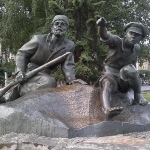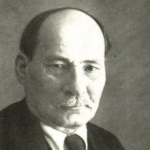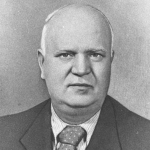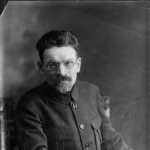Background
Vasily Isaakovich Talash was born on December 25, 1844, in Novoselki, Minsk Governorate, Russian Empire (now Homyel'skaya Voblasts', Belarus) to the family of Isaak Talash.

1943
Yakub Kolas and Vasiliy Talash in the office of the writer.
1944
Belarussian partisan Vasiliy Talash.
Yakub Kolas Square, Minsk, Belarus
Minsk monument to Ded Talash.
Portrait painting of Vasiliy Talash.
Vasiliy Talash and the messenger of the partisan detachment Nikita Sheshko.
Portrait photo of Vasiliy Talash.
Talash and Secretary of the Central Committee of the Communist Party of Belarus Timofei Gorbunov among pilots.














Василий Исаакович Талаш
farmer forester military peasant partisan
Vasily Isaakovich Talash was born on December 25, 1844, in Novoselki, Minsk Governorate, Russian Empire (now Homyel'skaya Voblasts', Belarus) to the family of Isaak Talash.
There is a widely spread myth that Vasiliy Talash received no education and wasn't able to read or write which is not true. He passed the exams for the three forms in the times before the abolition of serfdom in the Russian Empire.
In his youth, Vasiliy Talash grazed cattle in the estate of the local landowner. For some time he rafted timber along the Pripyat to the Donbas. He worked as a foreman on the river.
Talash got land by the Decree on Land in 1918. After the outbreak of the Soviet-Polish war, despite the lack of military experience, he took part in hostilities on the side of the Soviets. In 1919, Vasily Talash was elected a commander of a partisan detachment consisting of 300 people to fight with the Polish troops, who returned the land Talash had received to the landowner. At the end of November 1919, a detachment of Polish sailors who had an order to expand their military fleet on Pripyat stopped at Novosyolki. The joint strike of the Red Army detachment, as well as the partisans of Talash helped to destroy all the sailors in Novosyolki. Talash himself became a scout of the 2nd battalion of the 417th regiment of the 47th division of the Red Army. He contracted typhoid fever and was sent to a hospital in Gomel. After another exacerbation of the disease, he ended up in a front-line hospital in Kalinkovichi.
After the war, Talash became the chairman of the Novosyolkovsky Village Council and was a delegate to the VIII Congress of Soviets from the Polesie Region. He collaborated with the All-Russian Extraordinary Commission, helping to expose foreign spies and enemies. From the documents it is known that Talash repeatedly appealed to the Soviet authorities for several years, demanding a personal pension and being awarded the Order of the Red Banner. In 1927 or 1928 he was awarded this order. A personal pension was refused since there were no documents about his exploits. For some time Talash wrote to Yakub Kolas, demanding part of the fee for the “Drygva,” based on his Soviet-Polish war experience. At the same time, Vasiliy Talash did not enroll in the collective farm and lived separately.
After the start of World War II, since in Soviet times, Talash was persecuted as an individual farmer. The authorities wanted to take away his cow. He was dismissed from the position of a forester. According to documents on July 18, 1941, Talash agreed to become a liaison of the partisan detachment and propagandist of the partisan movement only after he was given a hectare of mowing as a compensation. He was twice arrested by the Germans. Talash was released after referring to the fact that he had fought with the Poles - the enemies of the German troops, but his order was taken by the Nazis. After being released from the second arrest, he left for a partisan detachment. In January 1943, from the island of Zyslov, in the Lyuban region of Polesie, he was sent by plane to Moscow.
In Moscow, Talash visited factories, state institutions, and military units with agitational stories about the combat affairs of the Belarusian partisans. He lived at the Moscow Hotel, where he met Yakub Kolas. This meeting was filmed. At the end of 1943, Talash returned to the freed Novobelica - the outskirts of Gomel. Then he went to the native village of Novosyolki, where he lived until the end of his life working as a forester.

Vasiliy Talash is considered a Belarusian national hero. He received the Order of the Red Banner in 1928. He became a character of "Drygva", the famous story by Yakub Kolas. Composer Anatoly Bogatyryov in 1939 created the opera "V pushchakh Polesie" on it. In 1943 he also received the Order of the Patriotic War and "To a Partisan of the Patriotic War" Medal. A monument to Talash was installed in Minsk. Talash's house at the village of Novosyolki was turned into a museum dedicated to his life. A 4-episode film "Talash" based on the story "Drygva" was shot in 2011.
There is no evidence of Vasiliy Talash's religious views.
Talash was an active participant of the Soviet propaganda.
Talash used to get up at five in the morning. He didn’t smoke, practically didn’t drink alcohol, but sometimes he sniffed tobacco, which he kept in a Polish snuff box. Talash was quick-tempered and did not miss the opportunity to take advantage of the situation. He also had a good sense of humour.
Vasiliy Talash had two sons and three daughters. Sons' names were Dmitry and Daniil.
Nikita Sheshko and Talash got acquainted in Moscow while participating in ideological work among Soviet citizens.

Yakub Kolas' short story "Drygva" was published in 1934. Before the war, the play “V pushchakh Poles'ya” was created based on it and a feature film was shot, after which Talash gained fame among Byelorussian people. Meanwhile, Talash himself was outraged by the work of Yakub Kolas. In his opinion, the writer did not glorify but defamed him. In the story, Kolas mentioned an episode when the old partisan “scattered” three Polish legionaries. Meanwhile, Talash himself assured that there were at least five Poles. They later met on more friendly terms in 1943.


Kalinin met with Talash after the latter requested it and had a conversation with him. After a while, Talash received a duplicate of his battle order that had been taken by Germans.
